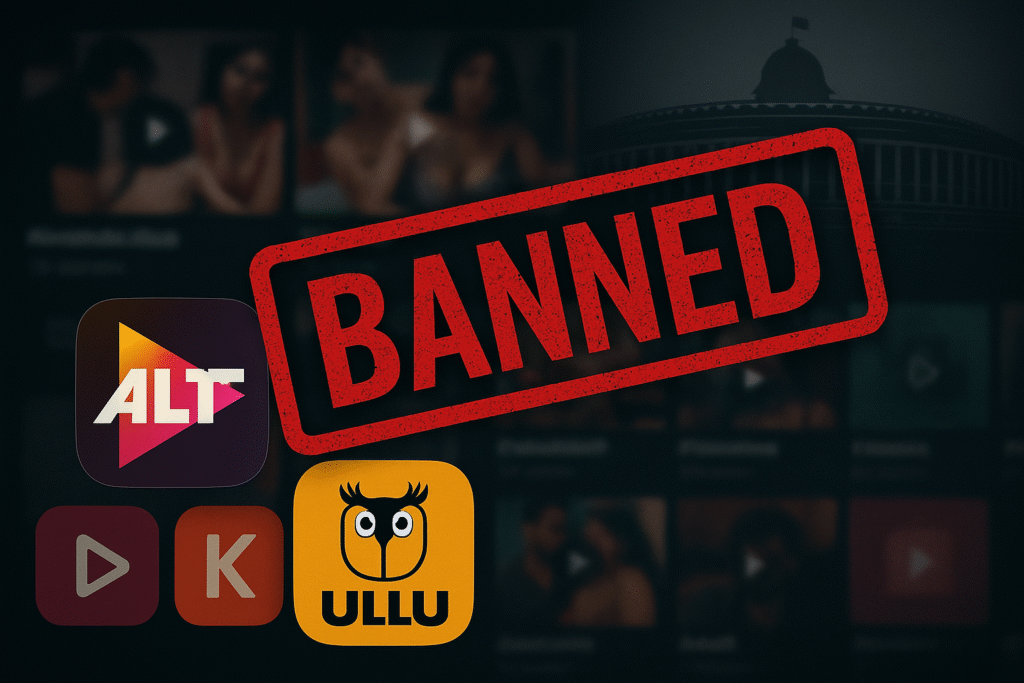India Cracks Down on 25 Streaming Apps Like Ullu and ALTT Over “Obscene” Content
In one of the biggest digital crackdowns in India to date, the government has ordered the banning of 25 streaming apps, including wildly popular platforms like Ullu and ALTT, citing concerns over “obscene” content. While many global users may not recognize these names, these apps boast millions of Indian users — some even paying subscribers — who rely on them for edgy, adult-themed entertainment.

🚫 Why Were These Apps Banned?
The Ministry of Information and Broadcasting issued this ban under the Information Technology Act of 2000 and the IT Rules of 2021. The decision came after mounting pressure from the National Commission for Protection of Child Rights and a Parliamentary IT Committee, both of which raised red flags about the availability of mature content with little to no age verification.
While platforms like Netflix and Amazon Prime have previously faced content regulation in India, this new ban specifically targets smaller, more localized OTT services that gained massive followings by producing bold, low-cost entertainment in regional languages.
📱 Who Are Ullu and ALTT?
These names might not be mainstream internationally, but in India, Ullu and ALTT have carved out a niche market with their provocative storytelling, regional language content, and affordable subscription plans.
- Ullu, for example, had nearly 105 million app downloads, with over $11 million in revenue and a reported $24 million valuation.
- ALTT, backed by Indian production giant Balaji Telefilms, earned ₹202.6 million ($2.3 million) in 2025 alone and amassed 1.06 million subscribers.
Their success lies in offering hyper-local, adult-themed content that mainstream platforms often avoid — but that millions of Indians clearly consume regularly.
🌐 What Happens Now?
As of July 2025:
- Google and Apple have been asked to remove these apps from their stores.
- Several of the banned apps have already disappeared from the Play Store and App Store in India.
- Websites linked to these platforms have been rendered inaccessible via most Indian ISPs.
However, enforcement remains tricky. Many apps offer APK downloads directly from their sites, bypassing app stores altogether. Some platforms also continue to market via Instagram Reels, YouTube Shorts, and Telegram — making a full ban almost impossible to enforce completely.
📈 The Bigger Picture: Censorship vs Free Expression
While the government’s move is positioned as a response to growing concerns over child safety and public decency, critics argue it raises important questions about digital censorship, artistic freedom, and the blurred lines of what constitutes “obscene” content.
India has long grappled with regulating online content without infringing on freedom of expression. And although explicit content between consenting adults is not illegal, vague legal definitions make it easier for authorities to act under moral or political pressure.
🧠 Why This Matters
For millions of Indians, these apps represent more than just entertainment — they’re part of a broader cultural shift towards digital freedom, regional content creation, and alternative storytelling. But the lack of clear guidelines around content moderation continues to put both platforms and viewers in a grey zone.
💡 Final Thoughts
This crackdown reflects the Indian government’s ongoing struggle to balance cultural values with internet freedom. While protecting users from truly harmful content is essential, many are left wondering — where do we draw the line between obscenity and expression?
As platforms like Ullu and ALTT look for ways to stay afloat — and users turn to proxies and third-party apps to access content — it’s clear that the battle over digital entertainment in India is far from over.

